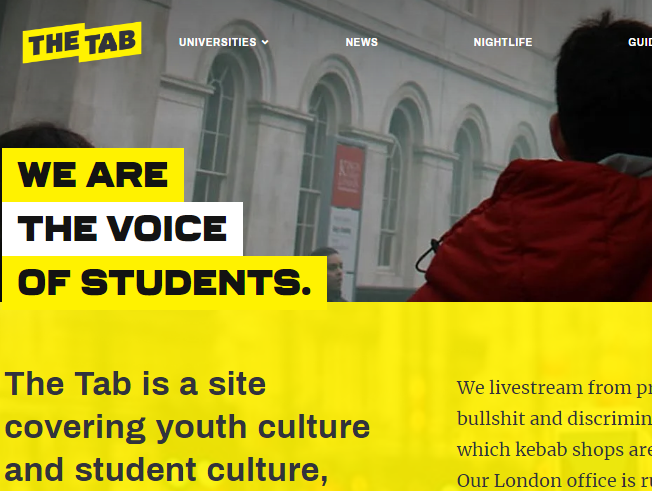
Student news network The Tab has been in profit every month since it was bought by the owner of the satirical Daily Mash last autumn.
Digitalbox bought The Tab for £750,000 in October last year and said its first order of business would be to get the brand into profit for the first time.
The company has now revealed it got The Tab into profit from its first full month of ownership by changing from a direct sales operation to an automated programmatic advertising solution delivered through Digitalbox’s Graphene ad stack. An element of branded content solutions remains.
Digitalbox chief executive James Carter told Press Gazette the programmatic revenue was much more efficient.
“What we’ve done is managed to take out costs, replace unprofitable revenues with profitable revenues really in very simple terms,” he said.
The Tab reached a total audience of 34m unique users in the first six months of this year, up 15%. This was an average of 6.3m each month.
The brand has a central editorial team of ten for its national news website, which has remained consistent since the sale. It also has hundreds of student volunteers working on more than 30 sub-sites at universities across the UK.
‘Content is king’
Carter said he wants to grow The Tab with investment in certain areas like politics to broaden its footprint.
“Editorial growth is going to be key to its future position,” he said. “So if we’re going to invest in anything on any of our products it’s chiefly around editorial teams to create the growth.
“Content is king for us, and we will then just monetise it in a different way to a more traditional monetisation team with direct salespeople.”
Carter said across Digitalbox’s three brands, also including the Entertainment Daily website, there was a bounceback in advertising in the final quarter of 2020 which was “significantly above” the same period in 2019.
“What seems to be the case is there’s more and more competition for high-quality advertising inventory, which is presenting good viewability stats and the entire mix of metrics that people buy against,” he added.
Carter said the Covid-19 pandemic had accelerated digital advertising trends, particularly on mobile devices, by two or three years.
Digitalbox’s half-year results for January to June this year, published on Tuesday, said it believes its “continued focus on mobile content consumption is the right one and that the consumer behaviour that was accelerated by the pandemic is here to stay”.
The company also said the success with The Tab’s model “forms part of our plan when evaluating future acquisition targets”. Carter said it validated Digitalbox’s “buy and build” strategy.
Overall Digitalbox reported revenue of £1.3m between January and June, up 37% on the year before. This is attributed to the purchase of The Tab and stabilisation from the market disruption from the pandemic in the first half of 2020. Without The Tab, revenues were flat year-on-year.
Entertainment Daily was the biggest revenue-generator, with £917,000 in the half-year. The Tab brought in £333,000 and The Daily Mash £95,000.
Entertainment Daily reported a half-year adjusted operating profit of £591,000 and The Tab of £161,000. The Daily Mash had a £28,000 loss.
The company had a pre-tax profit of £0.1m compared to a loss of £0.1m the year before.
It also said gross margins were up from 71% last year to 84%, highlighting its efficiencies.
[Read more: Daily Mash editor says ‘There’s an incredible amount of fact-checking given we’re technically making everything up’]
Daily Mash ad-free trial
Although Digitalbox is confident in its advertising model, it has decided to diversify and try out a subscription offering on the Daily Mash, in part to “maintain a direct dialogue with the site’s audience base”.
Carter said the company had looked at sites with common audiences and noted how “left-leaning” people were prepared to pay to exclude adverts on The Guardian.
The Daily Mash therefore began trialling an ad-free experience for £2 per month, £20 per year or £200 for a lifetime.
“It’s clear that there’s a loyal supporter base who are prepared to get involved with the Daily Mash and help it move forward in a way in which it has a broader base of support beyond straight advertising,” Carter said.
[Read more: Daily Mash hit by Facebook anti-misinformation algorithms as publisher Digitalbox reduces losses]
The company was “disappointed” the BBC did not recommission its affiliated TV show The Mash Report hosted by comedian Nish Kumar, but is pleased it has now moved to Dave as Late Night Mash as it will have more freedom on a commercial channel.
The Daily Mash reached 1.2m people on average each month between January and June. Entertainment Daily reached 6.1m.
Email pged@pressgazette.co.uk to point out mistakes, provide story tips or send in a letter for publication on our "Letters Page" blog
